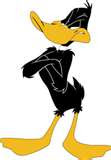I was invited to contribute an article to a Theatre Website. After I finished writing, I decided to also post the text here. It's not bad. Comments would be nice.
WHAT MAKES GOOD THEATRE?
To explore an answer to this question, I must first expand it slightly – what makes good theatre for me? In other words, I start with the premise that not everyone looks at “theatre” the same way. This observation allows me to create a simple rule - If I see something and like it, it’s good theatre. If I don’t, it isn’t.
Why complicate something that’s subjective to begin with?
“This above all: to thine own self be true.
And it must follow, as the night the day,
Thou canst not then be false to any man.”
Yeah, yeah, thank you Willy for filling in the last half of the rule – How can I expect anyone else to believe in what I do … if I don’t?
Look at it this way. We live in an age of “good enough.” If there’s something in your play that’s “good enough,” it’s not. Fix it! Find it and change it until it is a treat all by itself. Get the idea? Your work should be one treat falling over another. Make blah blah transitions into memorable highpoints.
Here’s another constant; as a director, make your stage picture attractive – always always always. This should be obvious, but apparently isn’t – your actors aren’t there merely to occupy space. Think of them as pawns in a Maxfield Parrish painting. Let one picture flow into another. Get passionate about this, because it’s important and infusive.
So … you getting the idea yet? Good theatre is all about you. Look your best. It’s your first date with a drop dead gorgeous redhead.
Weave your style throughout the play you are directing. Be bold in presenting your personality. Why? Because great theatre goes beyond what is on the written page. Once a playwright adds “The End” to a script, no matter how well written it may be, that script becomes history. Even before the first printing, the society that spawned it will have evolved. Your personality encourages a homogenous relationship between your audience and the playwright. (I presume you are in agreement, understand and support what the playwright is saying. I assume you actually have – or can convincingly fake – a personality.)
Listen to what your actors suggest. Your authority won’t be emasculated by listening, and sometime you will be given a real gem of an idea (for which, in spite of your modest denials, you will ultimately be given the credit).
Don’t be afraid to make mistakes. A mistake won’t destroy your career. (Probably.) A mistake only tells you what doesn’t work. That’s all. (Mostly.)
Don’t be afraid to break the rules. In fact the rules change almost daily. Absolutely nothing is sacred. Expand your mind past the physical limitations you observe while ambling down the aisle toward the stage. What can you see? What could you see? What might be improved by being unseen? (And who knows? You could get lucky and actually do something innovative, and they would erect a statue of you directly across the street from the statue of George Cohan, thus forcing the pigeons to make hard decisions regarding which statue to visit in order to … visit. Wouldn’t that be great?!)
And finally – remember the old adage “Don’t sweat the small stuff,” followed by “It’s all small stuff?” Remember that? Well, ignore it. In creating great theatre it should be “Sweat the small stuff,” followed by “Because there’s no big stuff.” Past the obvious disciplines of blocking, pace, and characterization, everything – and I mean everything - is detail and nuance. Everything is foreshadowing, motivation, color, mood, temperament, subtext, and the list of details goes on and on. Take care of these, concentrate with everything that’s in you on these, and by seeming magic the big picture is suddenly there. It may not be exactly what you expected – it seldom is. But it will be true, and that’s everything.
A little over fifty years ago I saw THE GLASS MENAGERIE for the first time. I still remember that production, still distinctly remember all the sights, sounds – even the sweet smells. I’d like to think that – fifty years from now – someone will remember my work that way.
If that happens, I’ll know why.
On my own, with all of my falls.
12 years ago
















4 comments:
all very sound advice. :)
You make very good points. It sounds a lot like writing...
This is good, Jack, I appreciate the advice. Thanks!
You've put into written words, on a flat screen, what is pertinent to a primarily auditory and visual art. Your words come alive, just as your directing brings to life the script with The End on the last page. You've done it again. You've been true to yourself.
Thanks
Nancy
Post a Comment